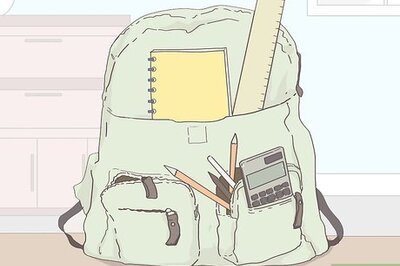
views
With India’s COVID-19 statistics demonstrating an upwards, concave trajectory, the situation continues to be alarming, and so are the challenges pertaining to waste generation and management during this period. Biomedical Waste (BMW) quantities, which were nearly 559 TPD in 2017, are expected to increase substantially. For instance, the city of Wuhan in China witnessed a six-time increase in biomedical waste quantities during the peak of the COVID-19 outbreak. With only 92.7 per cent of the BMW getting treated and 07 states lacking BMW treatment facilities in 2017, a strategy to handle and monitor the increasing BMW quantities in India under COVID-19 situation needs to be in place.
On the other hand, if we look at the Municipal Solid Waste (MSW) stream, household waste is mixed with domestic hazardous waste such as used needles, masks, gloves, bandages etc., and recyclables like plastics and cardboards, all of which may be contaminated with COVID-19. This poses a serious risk to frontline sanitation workforce. The latest research reveals that there may be a significant number of COVID-19 asymptomatic carriers who can cause transmission. This is a cause of further alarm for the sanitation workforce handling MSW.
The Central Pollution Control Board has issued guidelines for handling, treatment and disposal of waste generated during treatment/diagnosis/quarantine of COVID-19 patients (revised on April 19, 2020). However, the safety of the sanitation workers who manage general MSW in our cities and allow us to stay safely in our homes during this lockdown has not been satisfactorily addressed. Waste audits conducted by TERI in 2019 revealed that in East Delhi, South Delhi and North Delhi, around 88 per cent, 89 per cent and 95 per cent of households, respectively, were handing over domestic hazardous waste with general MSW. This exacerbates concerns amid the COVID-19 crisis.
Similarly, many waste management plants across the country are facing challenges in protecting their workforce and ensuring their daily attendance. Working with inadequate Personal Protective Equipment (PPE) and amidst sub-par working conditions, the workforce is afraid to collect door-to-door waste, fearing infection.
The current pandemic has also severely impacted the recycling economy. The demand for packaging products, office supplies and stationery items has reduced due to nationwide lockdown. On top of this, the supply of raw materials previously available due to informal waste collectors (ragpickers) — who, in turn, fed the formal chains of recycling—has also been disrupted. Even if recyclers resume operations, it will be difficult to have recyclable materials collected, as a lot of these ragpickers have returned to their hometowns and the ones available are understandably hesitant to step out.
Similarly affected are multi-layered plastic sachets or pouches or packaging with other plastic waste under Extended Producer Responsibility (EPR), a policy which integrates the environmental costs associated with products throughout their lifecycles.
The Solid Waste Management (SWM) Rules requiring segregation and segregated waste treatment were notified by the Ministry of Environment Forest and Climate Change in 2016. Their implementation via the Ministry of Housing and Urban Affairs and respective State Urban Development Departments needs to be more efficacious. Mostly, cities lack appropriate linkages to collect segregated domestic hazardous waste and send it for processing and disposal, although the SWM Rules of 2016 mandates linking domestic hazardous waste to hazardous waste disposal facilities.
For recyclable wastes, material recovery facilities with linkages with formal scrap dealers, recyclers and corporates (with EPR implications) helping cities earn revenues from waste have not been widely demonstrated. This can certainly help close the circular economy loop, by increasing waste recycling and recovery and reducing landfill space requirements. Moreover, organic waste management plants can even help cities access renewable energy sources or fuels like biogas, which can substitute fossil fuel demand and help make cities greener. It is equally important that such facilities operate at full capacity, with assured supply of raw materials as well as market demands for outputs.
There is an urgent need to establish impetus and showcase better mechanisms and systems that can help reduce the burdens on cities’ sanitation systems, and make recycling and treatment processes more robust and reliable. There is also a need to document the learnings from the COVID-19 crisis and formulate strategies to help make waste management safer in case of such pandemic situations.
In the future, our waste management will need more mechanisation and automation to reduce human contact. A higher level of mechanisation in waste management will have to span from waste collection to treatment. We will also require fully automated material recovery units and organic waste management plants with better machine learning and robotic applications, efficient enough to avoid carbon emission burden on cities, thereby reducing climate change impact. We might have to make our cities even smarter with electric vehicles for waste collection and handling, and using the energy derived from renewable energy stations. There is an encouraging demand for more focus on research and development in areas of waste management after the COVID-19 pandemic.




















Comments
0 comment